Some posts on this site contain affiliate links. If you book or buy something through these links, I earn a small commission (at no extra cost to you). Take a look at my privacy policy for more information.

Is there a love lock bridge in Amsterdam– and where is it?
The answer is a complicated yes and no! There is a bridge in Amsterdam where people used to add their love padlocks – BUT you’re not actually allowed to.
While I was in Amsterdam several years ago, I stumbled across a Love Lock bridge over the Groenburgwal Canal. The bridge had been decorated with hundreds of padlocks, each one engraved or inked with a couple’s initials or a declaration of love. The idea is that the couple locks the padlock onto the bridge and throws the key into the river, symbolising their promise to love each other forever.
I thought they were sweet, so I snapped a few photos of the bridge and shared a blog post. But later, I started to rummage through the internet to find the name of the bridge for a friend. And that was when I discovered that there was a fair bit of debate surrounding these love locks!
These padlocks are viewed as vandalism by the authorities and can impede the safe operation of the bridge. Amsterdam locals, on the whole, seem to be against them as well. So I decided to re-write this post with the latest info to explain things.
Is there a Love Lock Bridge in Amsterdam?
The Love Lock bridge I found in Amsterdam was the Staalmeestersbrug bridge, which crosses the Groenburgwal Canal. It’s a popular photo spot, with the tower of the beautiful Zuiderkerk in the background.
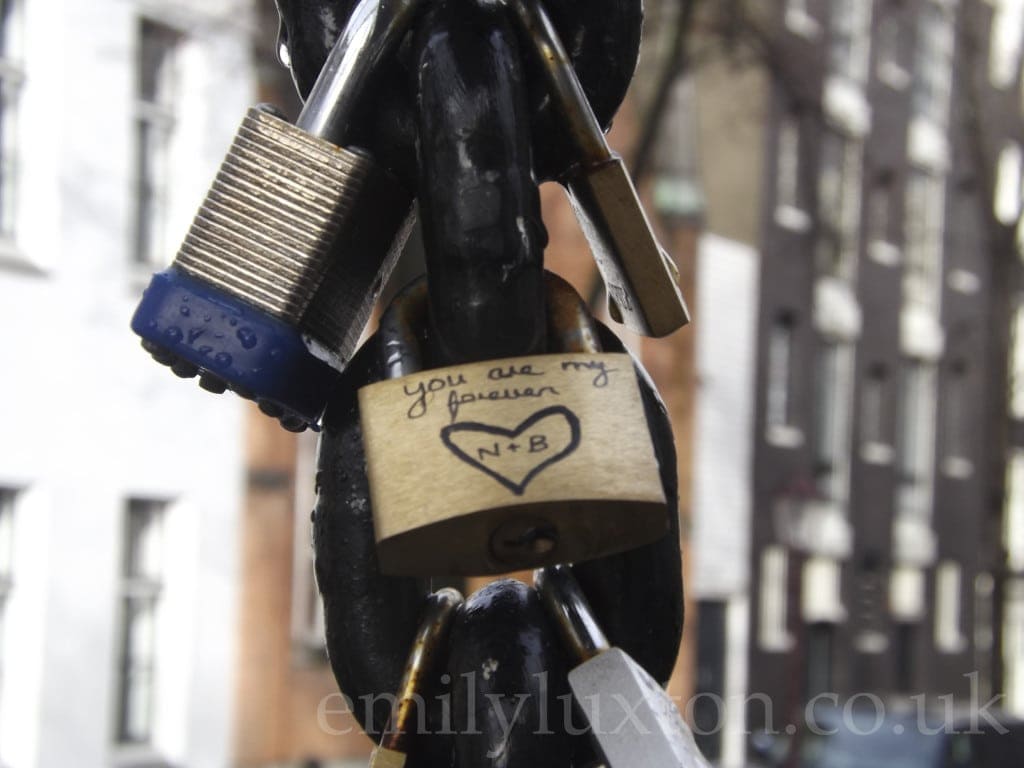
The drawbridge affords a great view of the Zuiderkerk (Southern Church) tower. Its sturdy black iron chains had been decked out with dozens of padlocks, each one marked with a sentiment of undying love.
A bit of digging online tells me there was also a second bridge in Amsterdam which was a popular spot for Love Locks. The Magere Brug (“Skinny Bridge”) which crosses the river Amstel was previously full of love locks – but they were all removed and it looks like no new ones have been added.
More recently, lovers have also been adding locks to a small bridge in the centre of the Vondelpark. It’s a smaller bridge and doesn’t cross a canal, so no boats pass beneath it.
However, love locks aren’t actually allowed on either of these bridges, and the local authorities regularly remove them. Apparently, when there are more than 13 padlocks on the Staalmeestersbrug Bridge they will be removed. The bridge in Vondelpark may escape notice for longer, as it’s small and no boats are in danger, but adding padlocks to this one is still not officially permitted.
Below is some more info on why the love locks are routinely removed…
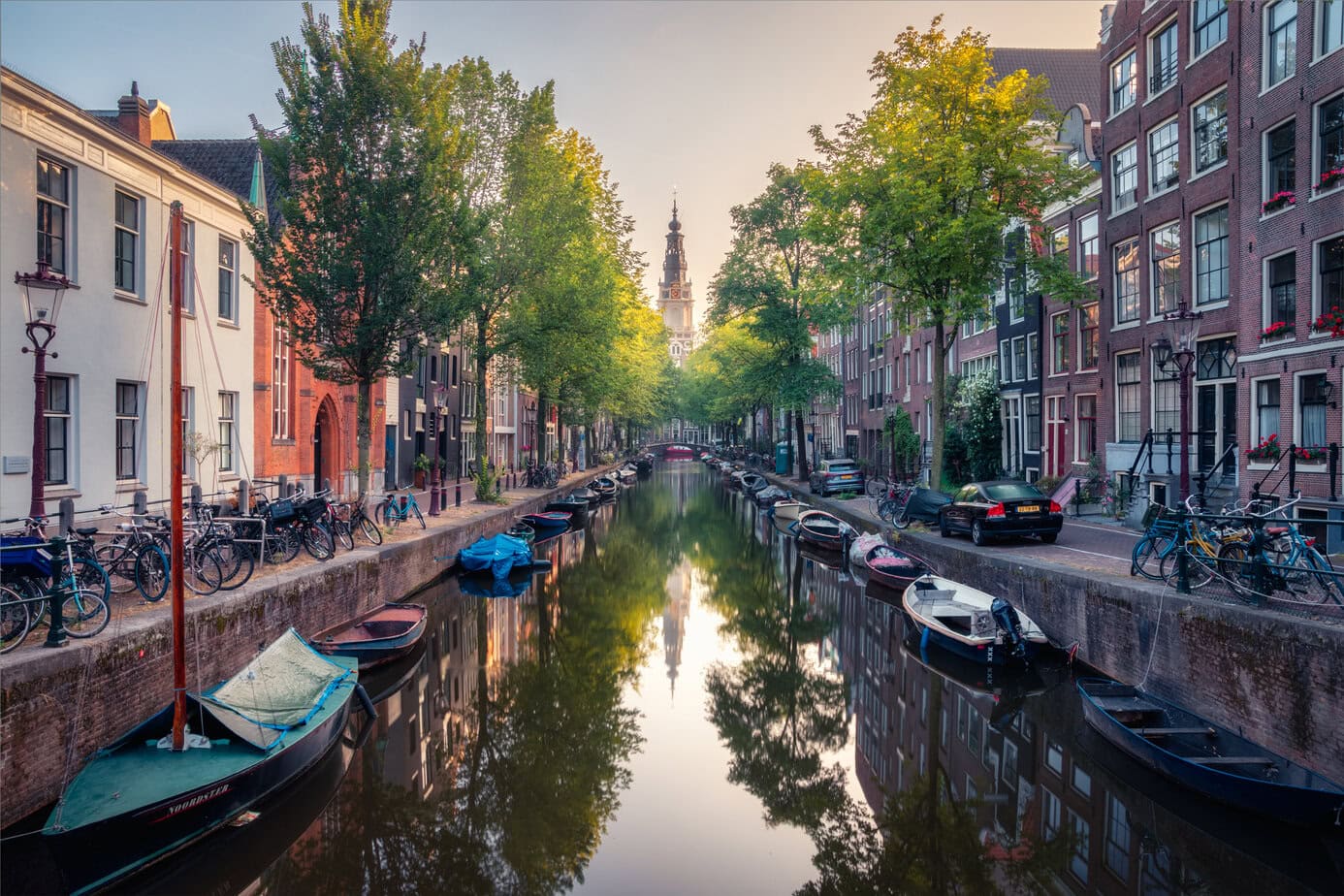
Why are the Amsterdam Love Locks Removed?
In May 2012, all the padlocks on the Staalmeestersbrug bridge were removed. It’s believed that the locks could cause damage to the bridge, so the council had them all removed using bolt cutters.
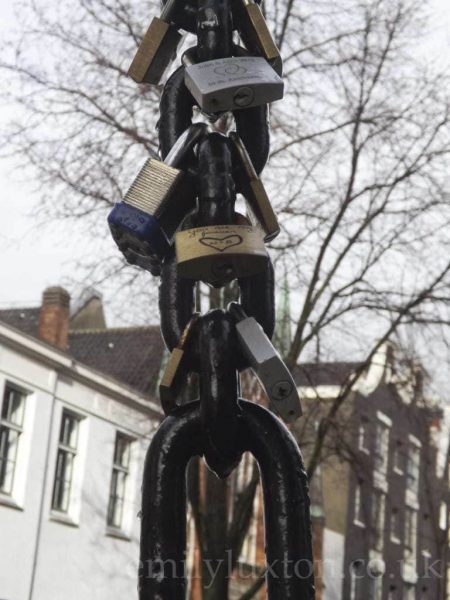
Some determined visitors keep restarting the collection, but these are systematically removed.
Even if you don’t agree that the locks are vandalism, no one wants to risk damaging a historic bridge, right? And throwing a metal key into a river seems pretty un-environmentally friendly.
On top of the potential risk, removing the love locks costs the city time and money. This is probably one of the reasons why most locals seem to hate love locks.
So in general, it’s probably not a good idea to add your own love lock to any of the bridges in Amsterdam.
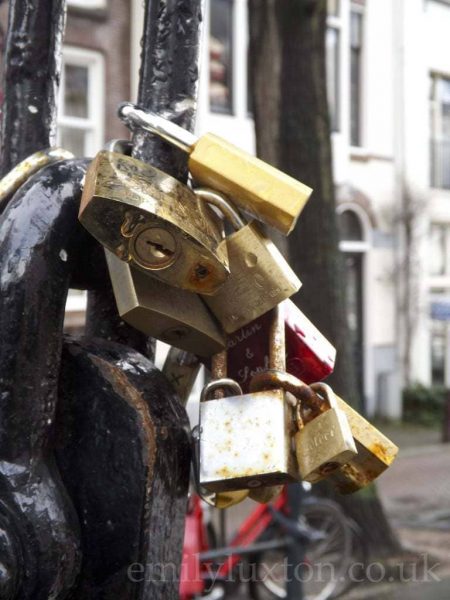
Are Love Locks Vandalism?
The original, or at least the best-known, love lock bridge was the Pont des Arts in Paris. You’ve probably seen pictures of the iconic bridge, covered in thousands of padlocks. In fact, there were close to 1 million locks on the bridge at one point.
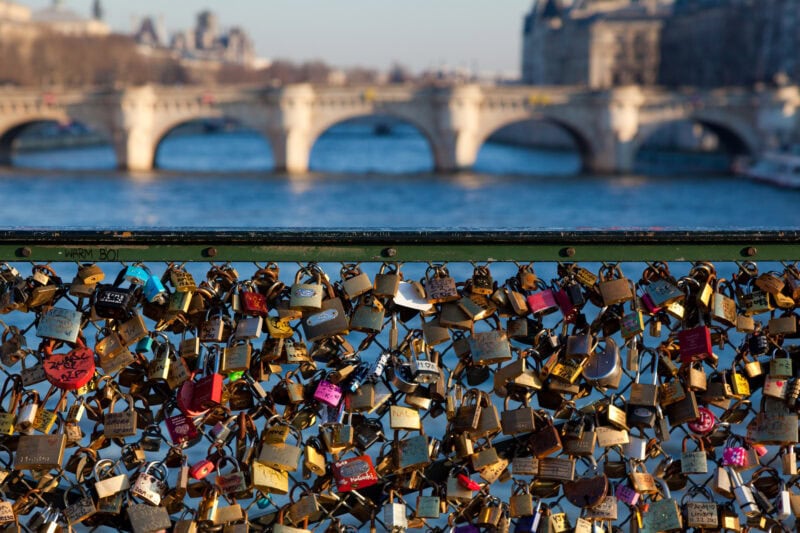
Then, in 2014, part of the bridge’s railings collapsed due to the love locks. The total weight of those padlocks was a pretty shocking 45 tonnes! The authorities began removing the love locks from the Pont des Arts and replaced the metal railings, which dated from 1804. As a result of all those love locks, a small piece of historic Parisian architecture was lost, and the whole bridge had been endangered.
Other cities have had similar problems with love lock bridges, including Venice and New York. In Chicago, where the bridges are raised up to allow boats to pass beneath, the local council regularly has to remove locks because if one fell onto a boat from a hundred feet in the air, it could cause serious damage.
The general consensus around the world seems to be that love locks are largely unsafe, especially on historic bridges which are less able to cope with the added weight. Leaving one is often considered an act of vandalism.
Are There Any Official Love Lock Bridges in Amsterdam?
However, some cities have embraced the idea of love locks. Others have added special installations specifically for people to hang locks on. For example, the Moscow council provided metal love lock trees along the Vodootvodny Canal.
In Amsterdam, however, there are currently no official love lock bridges. Locals don’t like them, and the council routinely removes them. So maybe find another way to declare your love in the Dutch capital!
What do you think? Are love locks on bridges a sweet act of romance, or dangerous graffiti?
![Love Lock Bridge in Amsterdam - Where is It? [UPDATED 2025] Love Lock Bridge in Amsterdam - Where is It? [UPDATED 2025]](https://www.emilyluxton.co.uk/wp-content/uploads/2018/11/Emily-Luxton_logo-smaller.png)



They can get overwhelming on a structure. At first the idea is nice, eventually it loses its romance.
Cut them off and find something new to do to show your passion.
Jim
Hi Jim, thanks for commenting. I think the sentiment behind the idea is lovely, but I definitely don’t agree with causing a potential safety issue just to leave a romantic message behind. I guess people need to be more careful where they choose to leave these!
I think it is great. Look what happens when hundred of thousands of lovers do this (in Cologne): http://www.flickr.com/photos/cclontz/6224079418/
Wow, that’s a lot of padlocks! I’ve seen the one in Paris before and it’s very similar. They certainly do have a lovely effect en masse like that.
I think (may be wrong) that the difference with the one in Amsterdam is that the bridge is a working drawbridge so it might be dangerous. Or is that just an excuse for officials to remove them?
Any of my readers know the answer?!
Unless things have changed since I left my home town a good while ago, any bridge that can open, will be maintained as such. Even today, the canals remain important for transport :)
I think it’s a nice gesture and art form but it’s better to put the locks on a bridge that can’t open. Enough bridges to choose from!
Agreed!
Hi Emily, its the same here in Berlin it became a major trend within the last year that those locks can be seen on every bridge possible. I first noticed it on a very old and pretty iron bridge where it actually damages the material of the bridge (oxidation of the locks with the bridge material). It actually is illegal on this bridge but I doubt that many people know this. However, there is this train bridge in Cologne where this is a tradition since many years and it is legal to hang locks…they did had to test the statics recently of the bridge because there are thousands of them!!
Hi Synke, thanks for commenting! I think it’s a shame to risk damage a historical site or to endanger a working bridge. But if you can find a good place for them, these padlocks look lovely!
The sentimental and guerrilla art value that these locks impose on their chosen structure is delightful! I love geneticfractals’ photo from Cologne. I also agree that the lock-placers ought to find somewhere innocuous to place the locks. It’s similar to the gum wall in Seattle. Cool concept!
Hi captain, thanks for commenting! I agree with you – it looks really cool when something like this takes over a whole structure. As long as people are careful and fair, I think it can create a really nice effect.
Beautiful! I’ve never heard of love locks before, now I shall be on the lookout. I agree with Salvinas – just put them somewhere to not impede the operation of the bridge. Thanks for sharing this! -Rene
Hi Rene, thanks for the comment. They are a lovely concept aren’t they?! And so pretty! I guess people just need to be considerate about where they leave them.
I was always fascinated whenever I saw suck lockets while traveling, but I’ve seen them everywhere now from Amsterdam to Seoul to Saigon. I guess every city has a bit of romance.
Hi Lily, they are romantic, aren’t they?! But I was surprised to find out they were to controversial!
Really love this idea of love padlocks. Just found our padlock in this youtube clip that someone has made. Love this:) http://youtu.be/t4Alu0EESRI
Aw that’s awesome :)
I may be labelled an unromantic philistine for this view but I hate them. The first one or two are sweet and romantic gestures, but then it just loses its original one off appeal as everyone jumps in on the act and it IS dangerous. There was a very recent story where there a bridge in Paris actually collapsed under the weight of all the locks and it was far from the first, would you like to walk across a bridge that you knew had its structural integrity seriously impacted? Sorry to bring reality to the romanticism but that is what happens. Bridges can be works of art in their own right without the vandalism that some people call ‘art’, why not just enjoy them as such?
I heard about the one in Paris collapsing, such a shame. I don’t think many people realise the damage it can do – from what I’ve read it seems more modern bridges are ok, but most people seem to go for the pretty antique bridges which is what causes problems. It’s a nice feature, just ill thought out I think :(
That’s it exactly, a nice thought, but not great in practice.
My view is that there is so much hatred, horror and pain in the world – which is constantly projected onto us my the media – that couples displaying their love for the world to see is beautiful! It restores my faith in humanity! R
Aw that’s a really nice sentiment! And I agree with you – but only if the padlocks aren’t doing any damage. I think cities should set up a designated area where it’s ok to leave them, as leaving the locks on antique bridges or even some modern ones can cause a surprising amount of damage.